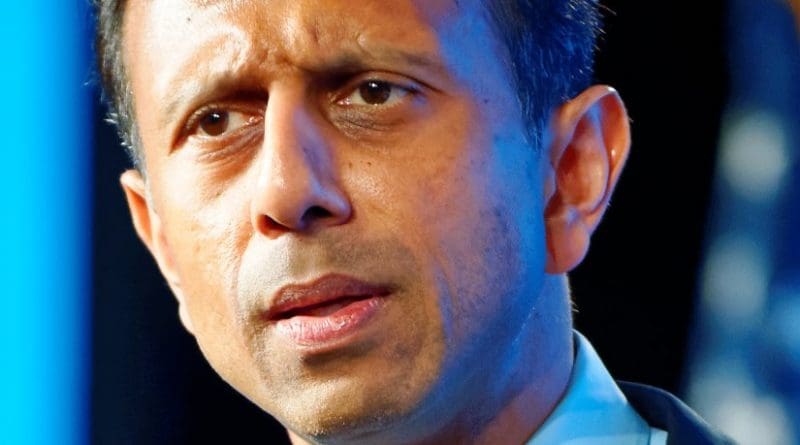Bobby Jindal And Politics Of Ethnic Identity In United States – Analysis
By Arul Louis
“We are not African-Americans, we are not Asian-Americans, we are not Indian-Americans,” Piyush Bobby Jindal declared earlier this year making the case for an all-American identity. These words are echoing with renewed vigour after Louisiana’s Republican governor announced his bid for the presidency of the United States of America, a white-majority, predominantly Protestant nation.
The words go to the heart of the Indian American identity and how it should define a candidate in a national race. Many Indian-Americans and Indians denouncing him for abandoning his hyphenated identity.
Jindal’s situation is not unique. He enters the presidential race with the burdens of ethnic or religion identity like many candidates before him. Obama had to contend with the legacy of his Kenyan Muslim father and his 2012 Republican opponent, Mitt Romney, with his Mormon faith.
American-born Jindal’s Indian ethnicity and his Catholicism are the shoals he has carefully navigated so far in a political career that drew on constituencies that are the polar opposite — the whites and the Evangelical Christians, a polite term for fundamentalists. He — and South Carolina Governor Nikki Randhwa Haley — have broken the liberal stereotype of a racist Republican Party in a socially backward South; yet, none of the liberal, Democratic states have non-white governors (save Hawaii, where Asians and Native Hawaiians are a majority).
Like human nature, the politics of identity is immutable. For all the contempt for Indian caste and religious politics, the United States is no different when it comes to the calculus of ethnic and religious politics.
Simple arithmetic shows that Jindal cannot win on the votes of Indian Americans, who are about 1 percent of the US population cannot vote him to power or even be a determining vote bank.
Jindal distancing himself from his Indian roots and his family’s Hinduism is no different from Edvige Antonia Albina Maino Sonia Gandhi downplaying her Italian roots and her Catholicism.
In electoral politics, Jindal has to grapple with voters’ perceptions of his ancestral land. India is identified with outsourcing and the resulting job losses. (Witness the Democratic Party’s revolt against Obama’s Transpacific Partnership (TPP) driven by job loss fears; they were joined by the working class-oriented Republicans.)
The technological powerhouse that India evokes is offset by call centers’ ineptness and intrusiveness, and lately, downright fraud.
Martin Luther King longed for a day his children “will not be judged by the color of their skin, but by the content of their character.” Strange as it may sound, Jindal railing against ethnic hyphenation harks to King’s dream. In effect, Jindal is asking not to be judged by his brown skin or his Indianess, but as an American.
Ironically, the liberal Democrats tried to play a twisted race card game during Jindal’s run for Louisiana’s governorship in 2008 when College Democrats, the student arm of the party, ran a campaign aimed at the racist right calling Jindal an Arab.
Jindal won’t be the first presidential candidate to downplay his ethnic or religious links. Obama distanced himself from his Kenyan family and heritage. Only into his second term is he planning a visit to Kenya.
Rather than focusing on African American causes, Obama broadened his appeal during his first campaign by invoking the angst of an American disillusionment with a long war amidst a looming recession. He had the lesson of civil rights leader Jesse Jackson’s stillborn candidacy in 1984 that revolved around his African American ethnicity and causes.
Way back in 1928, the first serious Catholic candidate for the president, the Democrat Al Smith, lost under the burden of his Catholicism and the questions it raised about his loyalties. John F. Kennedy in 1960 calibrated his campaign to deal with a repeat of it.
Mitt Romney’s Mormon faith has one thing in common with Hinduism: Common courtesies and political correctness can be suspended and it can be ridiculed and attacked with impunity. When the liberals and Democrats launched a stealth campaign about his religion, Romney worked hard to keep it out of the public debate.
Even Democratic Representative Amerish Babulal Ami Bera converted to the Unitarian Church while active in politics — unlike Jindal, who converted as a teen and Haley when she married a Christian.
Strangely, the extreme Hindutva crowd and the secularists who disdain Hinduism find a common cause in attacking Jindal’s conversion, but not in Bera’s.
And most across spectrum disdain him. Sixty-five percent of Indian Americans are Democratic Party supporters, according to a Pew Research Center survey, and only 18 percent back the GOP. Although Indian-Americans’ economic interests align closely with the Republicans’, a reason for the anomaly is the party’s perceived association with Christian fundamentalists.
The other liability for Jindal that might surprise those who view Christianity as a monolith is that he belongs to Catholicism, a sect considered un-Christian by the fundamentalists.
If he had had Republican political ambitions when he converted Catholicism as teenager he would instead have chosen one of the Evangelical sects, which wield power in the GOP.
He has cleverly bridged the gap by emphasising the conservative Catholic social agenda of opposing abortion, homosexuality and the like in order to downplay his Catholic faith in fundamentalist circles.
Earlier this year he tried to moderate the agenda set by his GOP constituency. “We’ve got to stop being the stupid party. It’s time for a new Republican Party that talks like adults,” he said. “We had a number of Republicans damage the brand this year with offensive and bizarre comments. I’m here to say we’ve had enough of that.”
But in practice, Jindal has been embracing the “Stupid Party” agenda. It may help boost Jindal’s standing in the GOP right wing, but it is likely to be a handicap and merely distancing himself from his Indian heritage won’t help.
*Arul Louis is a New York-based Senior Fellow of the Society for Policy Studies. He can be reached at [email protected]

